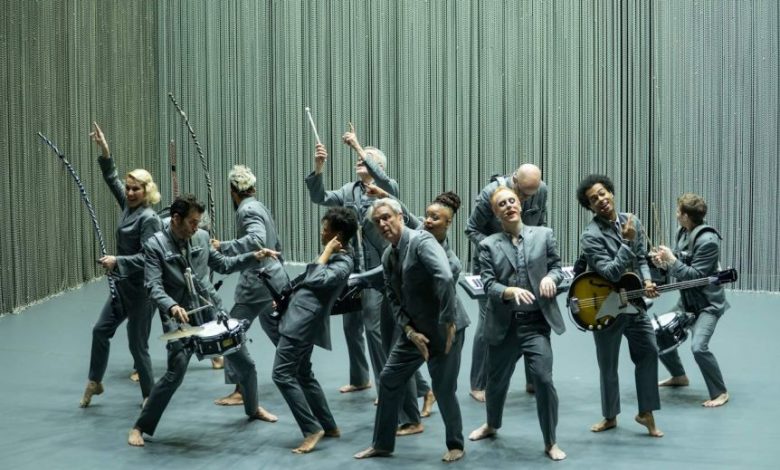
abc– From crashing CBGBs in a preppy polo shirt to scoring MTV airplay with love songs about urban anomie, Talking Heads frontman David Byrne has long pushed seemingly incompatible ideas to dizzying heights.
American Utopia, his 2019 Broadway show-cum-Spike Lee-directed concert movie, is no exception.
As the title suggests, it’s a response to life during Trump-time and a country wracked by bitter divisions, as well as a virtuosic musical exercise — moving between songs from the titular 2018 solo album, recent collaborations and Talking Heads favourites — that spotlights our common humanity.
The film opens with the white-haired Byrne alone on stage singing Here while cradling a brain in his palm — his own take on the famous Hamlet pose, or perhaps a nod to his quizzical anthropologist persona, cultivated over decades with the Heads and various projects.
Of course, the most immortal images of Byrne come from the band’s peerless collaboration with director Jonathan Demme, Stop Making Sense (1984) — an inspired grab-bag of Asian and experimental theatre influences that still roars with life, in which Byrne jogs, spasms, dips a lampshade as if it were a romantic partner and dons a comically oversized suit.
Echoing the earlier concert film’s taste for transparency and deconstruction, American Utopia has its band join piece by piece. The 11 members each pass through a shimmering chain-link curtain to enter the bare stage of New York’s Hudson Theater, which has been stripped of any electronic cables, mics or gear.
Also wireless are the musicians. Wearing matching tailored grey suits, though casually barefoot, they play instruments that transmit via Bluetooth, rendering them totally mobile. They’re required to be multi-hyphenate performers, providing harmonies and rocking out while constantly in motion.
The woozy emotional uplift of a song like This Must Be the Place (Naive Melody) is amplified by Byrne’s simple tai chi-like gestures, gently chopping and pushing the air, as the choreography by Annie-B Parson (a frequent Byrne collaborator) evokes the arty playfulness of Miranda July let loose at Studio 54.
At 68, Byrne is still a magnetic presence, but the hips don’t quite swing like they used to — those duties are taken by the two lead singer-dancers (Chris Giarmo and Tendayi Kuumba) and the bass player with a Gene Kelly grin (Bobby Wooten III). By the time everyone’s on stage for the Afropop-inflected nonsense anthem I Zimbra, the energy in the room is infectious.
In the concert’s standout ‘set piece’, the existential blow-out of Once in a Lifetime, Byrne staggers, buffeted by invisible waves, before slipping into his best evangelical preacher impression. His voice is strangely reassuring, shorn of the needling angst that haunts the original version of the Reagan-era hit. When guitarist Angie Swan lets rip, the band arch backwards under the suddenly blinding house lights, surrendering to the electric heavens that have just split open above them.
Across the show, the choreography works to spotlight each person’s vital contribution. As they pulse back and forwards in formation, players approach the front of the stage to glitter for a moment before returning to be a cog in the ecstatic machine; a dynamic illustration of the themes of connection and community that Byrne is advocating for here. (There’s also an echo of the Ross Brothers’ Byrne-sponsored high school colour flag spectacle, Contemporary Color.)
Inverting the classic P-Funk line “Free your mind and your arse will follow”, American Utopia suggests that together we can groove our way to a more compassionate world.
No stranger to Broadway, Lee (and cinematographer Ellen Kuras) capture the non-stop movement — a number of God’s-eye shots pay tribute to Busby Berkeley’s kaleidoscopic patterns — as well as the individual personalities of the 11 players: getting up close, we see everything from a wink passed between bandmates to the colour of someone’s toenail polish.
Byrne’s between-song chatter highlights the multicultural nature of the ensemble, who hail from Brazil, France, Canada and the US, sealed with the awkward if well-intentioned quip: “Most of us are immigrants and we couldn’t do it without them.”
Once a songwriter specialising in the inner lives of serial killers and far-left militants on the lam, Byrne has been shifting his focus outwards this side of the millennium — attending marches, uniting artists to protest the War in Iraq, and founding the online publication Reasons to Be Cheerful to curb what he sees as the rising pessimism of the times.
American Utopia sees Byrne fully step into the role of engaged civic activist, promoting empathy and inclusiveness (and reminding the audience to please, please vote).
Lifelong fans will no doubt bop along with the crowd to sweetly skewered renditions of Born Under Punches (The Heat Goes On) and Burning Down the House, but any passive escape from the present is checked by the surprising inclusion of Janelle Monae’s 2015 protest song Hell You Talmbout.
The group’s rousing performance — with lead vocals taken by others for the first and only time in the show — transcends the potentially awkward optics of, in Byrne’s words, “a white man of a certain age” covering a song that memorialises Black Americans killed by police.
He also gives creative space to Lee, who cuts between the live show and shots of relatives holding photos of the victims named by Monae’s song, punching up the act of bearing witness with his most cinematic intervention in the film.
Throughout the concert Lee keeps the focus tight on the stage, though he uses the whoops and cheers of the silhouetted crowd to heighten the buzz. We only properly see their faces (and one obligatory Vampire Weekend T-shirt) in the demonically zippy encore, Road to Nowhere.
Flinging themselves toward an unknown future, Byrne and his newfound Arcadian musical family exit the stage to parade through the aisles, sweat patches gleaming in testament to their exhausting, exuberant effort, just daring the Bluetooth to cut out.




